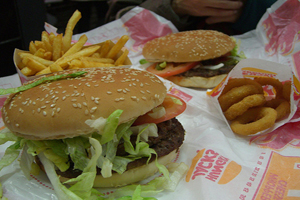 Calling fast food "high fat" is true, but misleading. Image courtesy of avlxyz.
Calling fast food "high fat" is true, but misleading. Image courtesy of avlxyz.
New research from UC Davis sheds light on how triglycerides induce atherosclerosis—the hardening of artery walls that causes heart disease—particularly in individuals with abdominal obesity. Unfortunately, however, the researchers credit the fat in the fast food meal they used to induce the triglyceride spike, while letting the more likely culprit, orange juice, completely off the hook.
In the study, researchers fed a fast food meal (two breakfast sandwiches, hash browns and orange juice, as noted in the press release) to people with either normal or elevated blood triglycerides. Triglycerides correlate strongly with risk of heart disease and are a better predictor of cardiovascular risk than total or LDL cholesterol.
After eating the horrible meal, triglycerides rose and LDL cholesterol was transported into cells in the artery wall, a process that leads to artery hardening and heart disease. This effect was worsened in the presence of cytokines, which are known to cause inflammation and correlate with a larger waist size.
